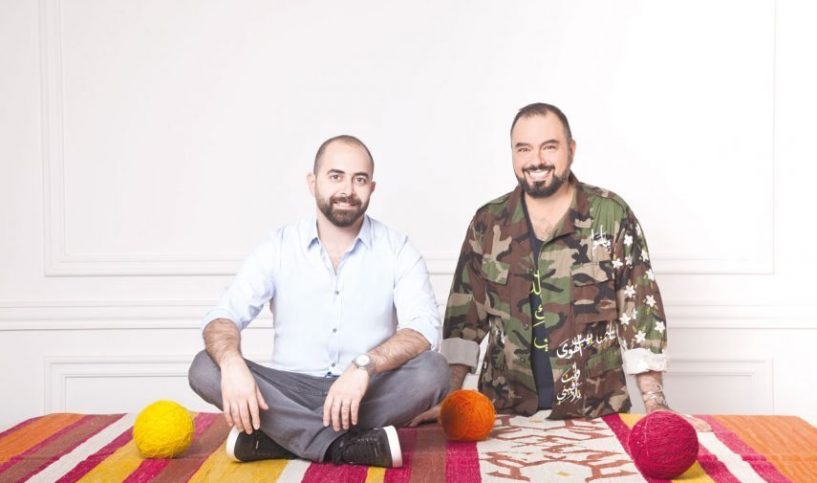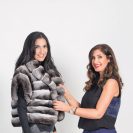A carpet can be so much more than an essential decorating piece for your space. Carpets are unique pieces; preferably handcrafted, no two should ever be the same, and as we have especially embraced in Middle Eastern culture, each carpet should tell a story with its weavings, colors and structure.
Wander into any Middle Eastern home and you will find floors scattered with kilims, or flat, woven tapestries originating from as far as the Balkans to Pakistan. You might also find the classic Persian rugs or locally made sadu weavings. In short, Arabs love their carpets, and we’re always on the look-out to find new additions to enhance the rich and vibrant colors of our homes with.
Enter Samovar Carpets and Furniture, a long loved family based business established by Alaa Hindi and Sons. Since then, the Samovar name has become synonymous with luxury and quality, posing as the go-to spot in Kuwait, Qatar and Beirut to find exceptional handmade carpets, furniture and antiques from around the world, and lately, the region’s own back yard! Succeeded by Haidar Hindi, Samovar has taken a new initiative to revolutionize the region’s carpet industry in a way that has never been done before, by introducing MOVA.
MOVA, an extension of the Samovar showroom, is an art gallery style space that is envisioned to host local and regional artists and designers for their future collaborations with Samovar Carpets in the woven medium. This vision was launched on the 15th of June 2016, when MOVA showcased its premier collection designed by local artist and mastermind, Abdulla Al Awadi.
Al Awadi is a Kuwait-based architect, teacher and artist, whose resume boasts experience in costume and jewelry design as well as photography and digital printing. Though his style of geometric patterns feature calligraphy and icons of the Arabic world that play with the notion of Islamic design, he refuses to accept that this defines his work: “Traditionally, Islamic inspired art was not for religious use but celebrated the traditions and culture of the country at a specific time in history,” states Abdulla as he speaks of his eclectic work. “When Haidar Hindi saw an exhibition of my digital art, he knew I was different and asked me to come up with some ideas for the launch of MOVA.” And thus, “Carpets of Love” was born as a collaborative collection boasts influences of tradition merged with classic geometric patterns, Arabic calligraphy, and a lot of love. Each piece in this collection is made from recycled materials with designs that are meant to merge elements to poetically represent different names celebrating particular stages of the “love” emotion, using calligraphy as a bold visual statement. “One of my other priorities was to celebrate traditional techniques applied to a design with either soft natural dyes or very strong and modern chemical colors”, he adds. “Our carpet tradition is very much alive and needs to be pushed into the future”.
“We are proud to launch MOVA with Abdulla Al Awadi’s collection as it has received international interest”, says Haidar Hindi.The international interest Haidar speaks of is their recently renowned piece “Shoug”, which translates to “longing”. Hand-woven in Turkey using recycled aged yarns, Shoug made its debut, along with seven other original kilims, at Dubai Design Days 2016. A representative of the Dutch non-profit Global Art Affairs (GAA) Foundation was reported to “fall in love” with Shoug, leading its purchase to be a permanent piece of the Art Foundation’s private collection, not to mention an exhibited piece at the 2016 Venice Biennale in Palazzo Michiel.
On its way to being world-renowned, pieces such as Shoug in Carpets of Love promise uniqueness, brilliance, and a story. These carpets target an audience that can appreciate this work for what it is: beautiful, traditional, exceptional and different.
Though they are still exploring this collaborative project, “Carpets of Love” has proven to encourage many artists and designers to approach Samovar Carpets for collaborations, and has separated Samovar Carpets from all the average carpet retail stores in the region. The collaborative movement Samovar and MOVA are starting with local artists also gives these artists a platform to launch their own creative concepts with MOVA’s support. Haidar also vehemently believes in artists of the region carrying the torch for the long-loved tradition of carpet design and production, which is poses as another inspiration to carry on with this project – especially because he thinks, in the Middle East, there is a niche in this market “We wish to provide local and regional Arab artists and designers the opportunity to express themselves in the woven art medium, and to become known for carpet design.”
But what does it take to make it into MOVA? How does one grab Haidar’s attention to form a collaboration? “That is a difficult question to answer,” he says, “initially, I go with my gut feeling, but then I have to visualize the work in a specific type of carpet weave and determine how it can be translated in woven art.” But more importantly to Haidar, the artist’s concept and story are key: it has to be memorable, and their work has to be separate from that can be conceived as commercial art – “we want to avoid that.”
Samovar Carpets & Furniture and MOVA are located in Al Tilal Complex in Shuwaikh Industrial. Call them at 2225 3456/7/8. Follow them on Instagram @samovarcarpets. Follow MOVA Gallery on Instagram @movagallery. For more information, visit www.samovarcarpets.com. Follow Abdulla Al Awadi on Instagram @abdullalawadi.
Photos courteousy of Tarek Moukaddem and Nawaf Al Ali.












